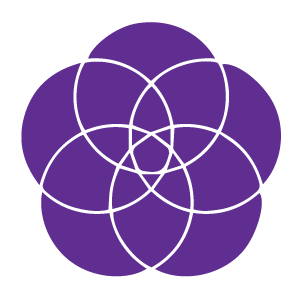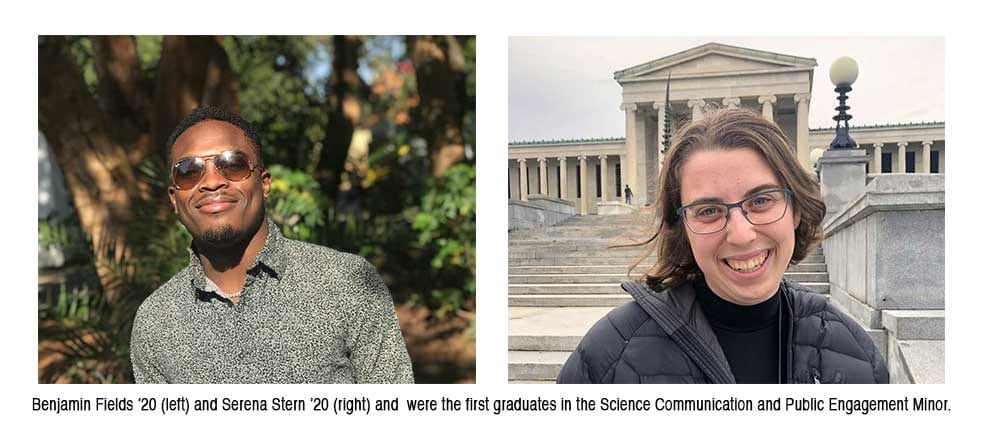By Kitty Gifford
Faced with a global pandemic, now more than ever the world needs people prepared to engage the public in a two-way conversation about scientific issues. Two students from the Class of 2020, who graduated from the College of Agriculture and Life Sciences (CALS), are entering the next chapter of their lives armed with these skills thanks to the new Science Communication and Public Engagement (SCoPE) minor at Cornell.
The SCoPE minor was officially announced in January 2020, and Benjamin Njila Fields ’20 and Serena Stern ’20 were the first two students to graduate with that degree.
As a double major in Development Sociology and Global and Public Health Sciences, Fields also participated in the Global Citizenship and Sustainability Program. He studied abroad in Zambia to learn more about global health issues, and he added the SCoPE minor to learn more effective ways to share his sociological observations with those outside his field of research.
“[The minor] allowed me to understand research more comprehensively, as I must be able to articulate very complex concepts in a friendly and easy manner,” Fields said.
Fields began a Ph.D. program in sociology and demography at the University of California, Berkeley this Fall. He plans to keep his science communication skills sharp by blogging, writing news articles and becoming more active on social media.
Stern noted that when she first came to Cornell she knew she cared about communicating science but didn’t know how to apply that interest. By taking all the “cool courses” she could fit into her schedule, a pattern emerged of applying her interests toward helping people. These small, experimental courses gave her the freedom to try out new things without having to invest the resources that would be required in a full course.
For example, through Community-Based Cancer Research Presentations and Discussions (BIOMS 5665), Stern and fellow students met and interacted with cancer patients and developed skills in communicating science to the public. The small course environment fostered close friendships, broadened her connections in the community, and led to a volunteer project with the Cancer Resource Center of the Finger Lakes, mentioned Stern.
After graduation, Stern decided to stay in Ithaca and continue her work at Cayuga Medical Center supporting a new initiative implementing person-centered care, guided by the certifying organization, Planetree International. Person-centered care prioritizes the active participation of patients and their families throughout the healthcare process.
To prospective students and current undergraduates, Stern implored, “Don’t be afraid to let yourself shift and grow. Also, take as many one-and-two-credit courses as you can. They are where I applied so much of my SCoPE knowledge. Using Cornell’s extensive resources, I’ve worked with birds, agriculture, environment, older adults, literature, healthcare and basic research. I wouldn’t have found many areas I love without those smaller courses.”
Stern and Fields are just two of many students who think that the skills taught as part of the SCoPE minor are essential for supplementing their other degrees. In a Cornell-wide survey of nearly 400 students, 75% said that having this minor on their diploma would enhance their prospects for professional opportunities.
“It’s important that science communication became integrated into the undergraduate curriculum,” said Mark Sarvary, Ph.D. ’06, senior lecturer in the Department of Neurobiology and Behavior and faculty adviser for the program. “This is the first time that Cornell has awarded bachelor’s degrees showing students gaining expertise in this field.”
The SCoPE minor is an interdisciplinary effort, and it incorporates classes from across the university. Undergraduates can gain specific expertise related to science policy, ethics, information literacy, communication skills and community engagement.
“It’s really great to see these students continuing Cornell’s legacy in science communication,” said Bruce Lewenstein, professor of science communication.
An advisor to the minor, Lewenstein has taught science communication at Cornell since 1988.
“From Anna Botsford Comstock to Carl Sagan and beyond, we have a tradition of Cornell faculty supporting science communication,” Lewenstein said. “We have students who have gone on to notable science communication careers, such as Jane Brody (CALS ’62), Bill Nye (Engineering ’77) and Nicholas St. Fleur (CALS ’13).”
The minor, hosted in CALS and open to all Cornell undergraduates, creates a network of instructors, students and community partners interested in both science communication and public engagement. Learn more about the minor here on our website, scicomm.cornell.edu, or email scicomm@cornell.edu.

